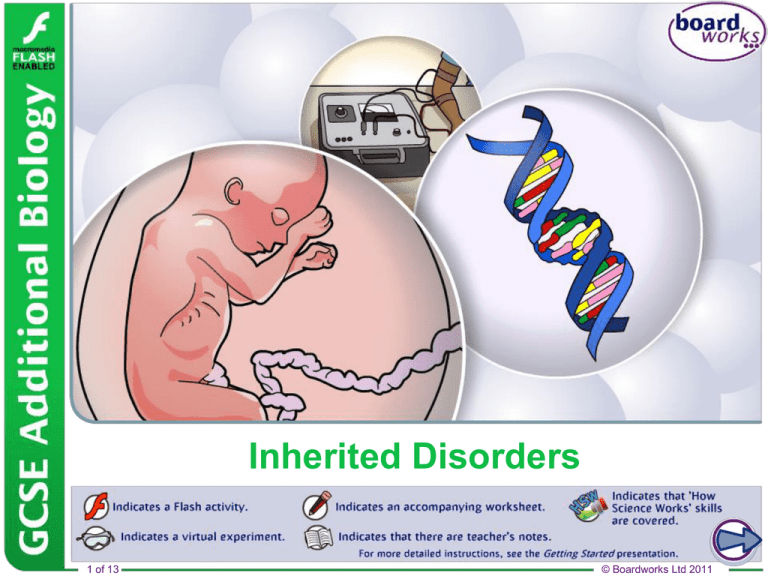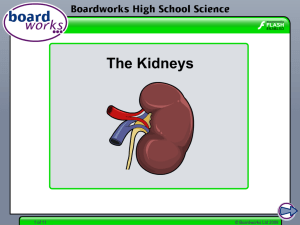Inherited Disorders
advertisement

Inherited Disorders 1 of 13 © Boardworks Ltd 2011 2 of 13 © Boardworks Ltd 2011 Inherited disorders Inherited disorders are caused by faulty genetic material that is passed on to future generations. They are sometimes called genetic disorders. One example of an inherited disorder is polydactyly, where someone has extra fingers or toes. This disorder is caused by a dominant allele. This means that polydactyly can be passed on, even if only one parent has the disorder. 3 of 13 © Boardworks Ltd 2011 Cystic fibrosis Cystic fibrosis is an inherited disorder that affects the cell membranes. Over 8,500 people in the UK have cystic fibrosis. Cystic fibrosis primarily affects the digestive and the respiratory systems. As a result, sufferers find it difficult to breathe and to digest food as their internal organs are clogged by a thick mucus. Cystic fibrosis is caused by a recessive allele. This means that the disorder can be passed on by two parents who are carriers, but who do not actually have the disorder themselves. 4 of 13 © Boardworks Ltd 2011 Cystic fibrosis 5 of 13 © Boardworks Ltd 2011 6 of 13 © Boardworks Ltd 2011 Diagnosing inherited disorders Cystic fibrosis in children is usually diagnosed with a sweat test. However, if a couple has a family history of cystic fibrosis, or another inherited disorder, they may want to screen their unborn child for the alleles that cause the disorder. There are two types of test: amniocentesis – fetal cells are collected from the amniotic fluid via a hollow needle chorionic villus sampling – fetal cells are collected from the chorionic villi in the placenta with a suction tube. 7 of 13 © Boardworks Ltd 2011 Fetal testing 8 of 13 © Boardworks Ltd 2011 Genetic screening 9 of 13 © Boardworks Ltd 2011 Regulating difficult decisions The Human Fertilisation and Embryology Authority (HFEA) is the independent body in the UK responsible for overseeing the use of embryos in fertility treatment and research. The HFEA decides which embryo research and embryo selection should be allowed. Science is advancing quickly, so the HFEA will increasingly have to make decisions about the ethics of new treatment and research. If something can be done, does that mean it should be? 10 of 13 © Boardworks Ltd 2011 11 of 13 © Boardworks Ltd 2011 Glossary 12 of 13 © Boardworks Ltd 2011 Multiple-choice quiz 13 of 13 © Boardworks Ltd 2011





![Direction_and_Scale[1]](http://s2.studylib.net/store/data/005432475_1-80ce3065f13008250a8cdec135db9846-300x300.png)


